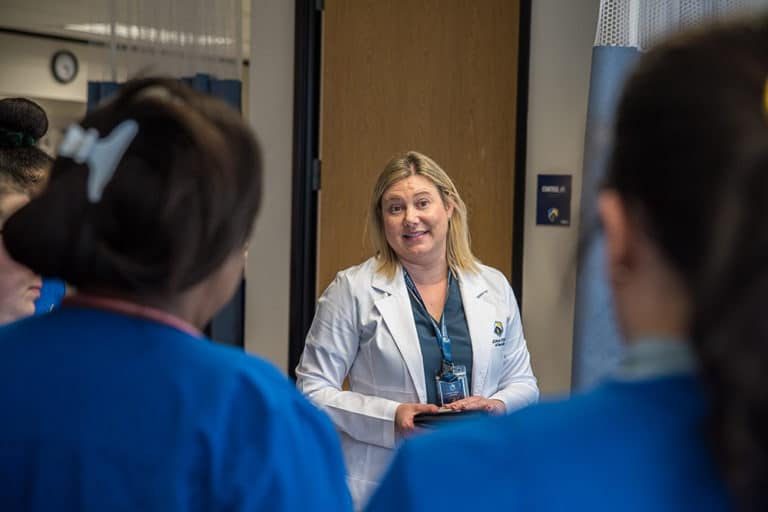
Become an RN in Utah:
FAQs at our Salt Lake City Campus
Become a Registered Nurse with a BSN degree at Arizona College of Nursing – Salt Lake City. Below you will find some of the frequently asked questions that future RN’s often ask our campus faculty and staff.
LPN School vs BSN School: What is the difference?
Understanding the differences between a Licensed Practical Nurse (LPN) program and a Bachelor of Science in Nursing (BSN) program is crucial to planning your nursing career path. This is because the education requirements between RNs and LPNs vary significantly. An LPN program typically takes about 1-2 years to complete. It is intended to prepare students for entry-level nursing roles to perform basic nursing care under the supervision of registered nurses (RNs) and physicians. While the time commitment to complete an LPN program is relatively short, LPNs often find their employment opportunities very limited.

A Bachelor of Science in Nursing is a far more comprehensive track that often takes four years to complete. BSN programs cover a far wider range of topics and offer much more in-depth training designed to equip graduates with the skills to provide a much higher level of patient care and the potential to work in specialized nursing roles.
At Arizona College of Nursing in Salt Lake City, we offer an accredited 3-year BSN program that can be completed in as little as 3 years. Our Utah nursing program is designed for individuals who are committed to the field of nursing and are looking for a fast and efficient path to a rewarding career. To learn more about the differences between an LPN program and a BSN program, read our blog article for more information.
Preparing Future RNs at Arizona College of Nursing – Salt Lake City
The length of time it takes to become an RN with a BSN can vary depending on the program and the student’s prior educational background. Bachelor’s degrees often take 4 years to complete, but with our 3-year BSN program, you can complete your Bachelor of Science in Nursing degree in as few as 3 years.
If you have completed some college credit or have a degree in another field, qualifying transfer credits can shorten your program length. To learn more about the pathway to becoming an RN with a BSN degree in Utah, contact an admissions representative at our Salt Lake City campus.
From 2020 to 2030, the Bureau of Labor Statistics estimates that the State of Utah could see the nursing job market grow by as much as 20%. This is much faster than the expected average growth of RN employment in the United States, which the BLS estimates will grow 6% from 2021 to 2031.
Updated August 2023. Source
Our BSN curriculum covers many essential topics for nursing practice, including clinical judgement, critical thinking, community health, critical care, gerontology, leadership, surgical care, obstetrics, pediatrics, and psychiatric care.
Applicants may take the NCLEX every 45 days in Utah. Applicants will have up to five years from the date of their graduation to complete the NCLEX successfully.
The length of nursing school can vary depending on the program and the student’s prior educational background. A Bachelor of Science in Nursing (BSN) program typically takes four years to complete if you start from scratch. However, if you already have a bachelor’s degree in another field or have completed some college credit already, you can often use transfer credits to complete an accelerated BSN program, which can be completed in less than four years. At Arizona College of Nursing, our accelerated BSN program can be completed in as little as 3 years, making it a fast and efficient path to a rewarding career in nursing.
Source: https://www.arizonacollege.edu/accredited-bsn-program/
According to the Bureau of Labor Statistics (BLS), Registered Nurses in UT have a median salary of $77,240 per year. However, RNs in the Salt Lake City typically earn more than the state median, estimated to be $80,080 per year. As you will be newly entering the workforce, it’s important to know that you will likely not start at the median rate but will likely increase your earnings with experience.
The Bureau of Labor Statistics states that Registered Nurses in Salt Lake City, UT range from a low rate of $63,540 per year to the highest-paid Nurses earning as much as $101,710 per year.
Updated August 2023. Source
In Utah, you may take the NCLEX exam as many times as necessary to pass successfully. However, if more than two years have passed since you completed the clinical portion of your nursing program, you will be required to take and pass a nurse refresher course. Source
There are various parts of the cost of becoming a nurse in the State of Utah. First, you must complete an accredited nursing program.
Next, the Utah State Board of Nursing requires an RN Endorsement ($150), an RN Exam Fee and Licensure Fee ($300), an RN Re-Exam Fee ($100), and a fingerprint fee ($50). Source
A Bachelor of Science in Nursing (BSN) is an undergraduate college degree designed to equip students with the training and studies needed for a successful career in nursing. The BSN curriculum includes both general education and advanced nursing studies. To increase your chances of finding a position in your state and city of choice, you should consider earning a bachelor’s in nursing science (BSN).
Registered nurses work in many healthcare-related settings. According to the Bureau of Labor Statistics, registered nurses held about 3.1 million jobs in 2021.
The largest employers of registered nurses were as follows:
- Hospitals (60%)
- Ambulatory healthcare services (18%)
- Nursing and residential care facilities (6%)
- Government (6%)
- Educational services; state, local, and private (3%)
Updated 2023. Source
